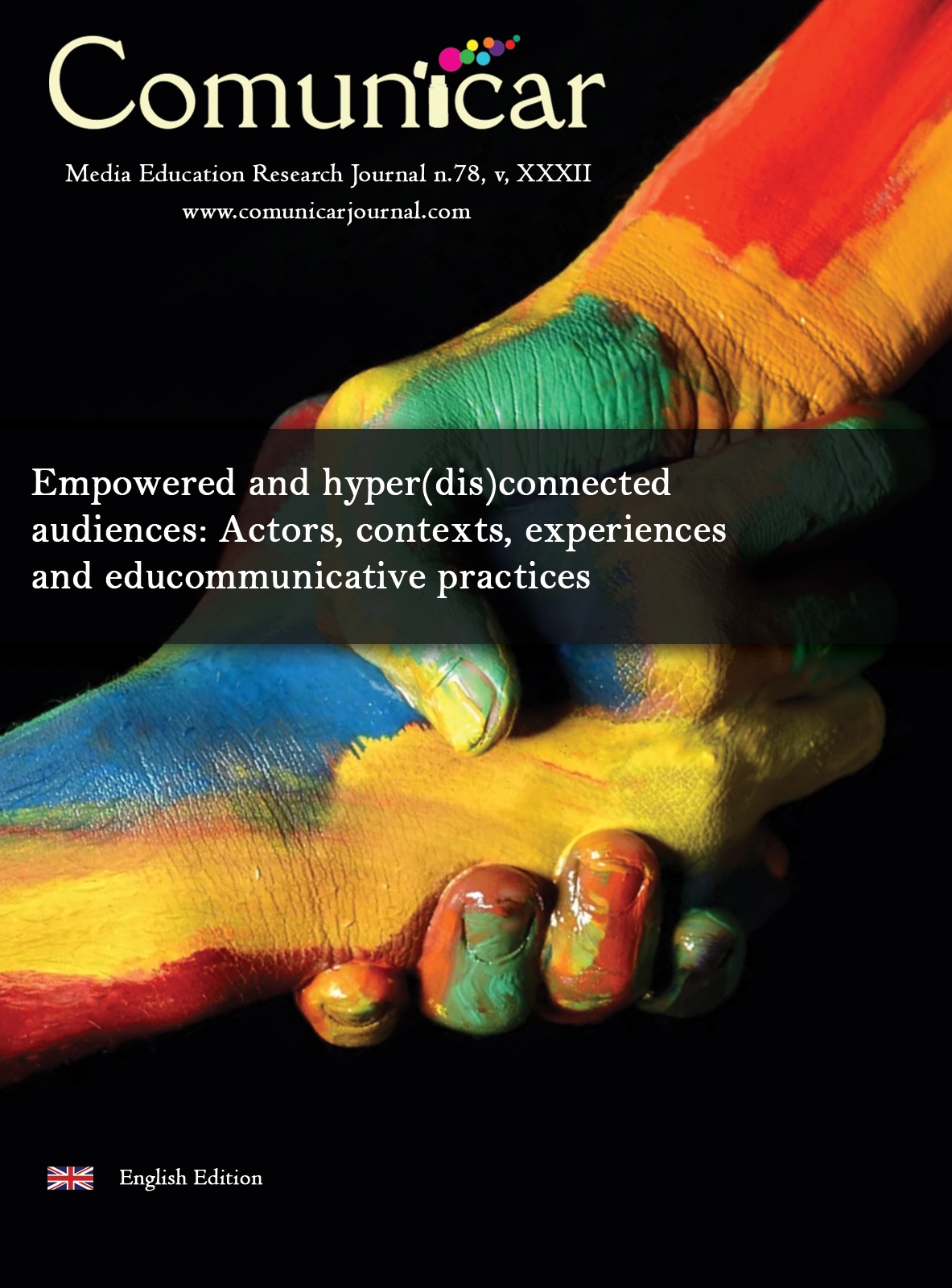想象、未来教育和民主文化:伊比利亚半岛的教育政策
IF 5.1
1区 文学
Q1 COMMUNICATION
引用次数: 1
摘要
在未来被视为威胁的历史时刻,教授想象美好未来的能力似乎非常重要。与此相一致的是,来自盎格鲁-撒克逊传统的未来教育(EF)代表了对未来消极形象的回应。另一方面,欧洲委员会界定的民主文化的能力为阐述一个理论框架提供了基础,该框架包括对民主和可持续未来的想象,作为其主要概念轴之一。鉴于这一理论背景,本研究分析了伊比利亚背景下执行的公共政策的官方文件,以检查教育系统中对未来概念的处理。具体而言,研究了三个层面的公共政策:国家教育法、小学教育课程和机构教师培训政策。运用内容分析的规范方法对公共政策进行分析,并采用句法抽样策略,计算分析单元的绝对频率和相对频率。结果表明,在公共政策中很少提及未来概念的构建,这表明教育他人想象理想未来的机会可能被浪费了。En un momento histórico En el que el futuro se concibe como una amenaza,父母与相关的教育和想象的未来可预见的能力。En esta línea, la Educación para el Futuro (EpF), de tradición anglosajona,代表了关于trabajo para responder的参考资料和las imágenes negativas sobre la idea del provenir。“文化能力”的定义,“欧洲委员会”的定义,“elaboración文化能力”的定义,“未来委员会”的定义,“未来原则”的定义,“概念原则”的定义,“未来原则”的定义,“未来原则”的定义,“未来原则”的定义,“未来原则”的定义,“未来原则”的定义,“未来原则”的定义,“未来原则”的定义。达达斯塔interjección teórica,我介绍了分析文件工作室的官员,políticas públicas llevadas和cabo . ámbito ibacimriko, para考试培训,未来的想法和教育系统。Concretamente, se han estudiado políticas públicas a res niveles: leyes educativas estales, currículos de Educación primary y políticas instituionales de formación docente, para indagar cuál es la presencia del eje conceptual sobre la imaginación de futuros en estos documentation。Las políticas públicas与本文章由计算机程序翻译,如有差异,请以英文原文为准。
Imagination, education for the future and democratic culture: Educational policies in the Iberian Peninsula
In a historical moment, where the future is considered a threat, it seems highly relevant to teach the ability to imagine desirable futures. In line with this, Education for the Future (EF), from the Anglo-Saxon tradition, represents a reference to give a response to negative images about the idea of the future. On the other hand, the competences for democratic culture defined by the Council of Europe provide the basis for the elaboration of a theoretical framework that includes the imagination of democratic and sustainable futures as one of its main conceptual axes. Given this theoretical context, this study analyses official documents of public policies carried out in the Iberian context, to examine the treatment of the idea of future in education systems. Specifically, three levels of public policies have been studied: state educational laws, primary education curricula and institutional teacher training policies. The public policies have been analysed using the normative method of content analysis, with a syntactic sampling strategy, calculating the absolute and relative frequency of the units of analysis. Results show that there are few references to the construction of the concept of the future in public policies and suggest that the opportunity to educate others on the imagination of desirable futures may be being wasted.
En un momento histórico en el que el futuro se concibe como una amenaza, parece altamente relevante educar en la capacidad de imaginar futuros deseables. En esta línea, la Educación para el Futuro (EpF), de tradición anglosajona, representa una referencia de trabajo para responder a las imágenes negativas sobre la idea del provenir. Por otro lado, las competencias de cultura democrática definidas por el Consejo de Europa dan pie a la elaboración de un marco teórico que incluye la imaginación de futuros democráticos y sostenibles como uno de sus principales ejes conceptuales. Dada esta interjección teórica, el presente estudio analiza documentos oficiales de políticas públicas llevadas a cabo en ámbito ibérico, para examinar el tratamiento de la idea de futuro en los sistemas educativos. Concretamente, se han estudiado políticas públicas a tres niveles: leyes educativas estatales, currículos de Educación Primaria y políticas institucionales de formación docente, para indagar cuál es la presencia del eje conceptual sobre la imaginación de futuros en estos documentos. Las políticas públicas han sido analizadas mediante el método normativo de análisis de contenido, con una estrategia de muestreo sintáctico, calculando la frecuencia absoluta y relativa de unidades de análisis. Los resultados muestran que hay escasas referencias a la construcción del concepto de futuro en las políticas públicas, y dan a entender que se puede estar desaprovechando la oportunidad de educar para la imaginación de futuros deseables.
求助全文
通过发布文献求助,成功后即可免费获取论文全文。
去求助
来源期刊

Comunicar
Multiple-
CiteScore
10.10
自引率
5.40%
发文量
40
审稿时长
20 weeks
期刊介绍:
Comunicar specialized in educommunication: communication and education, ICT, audiences, new languages...; monographs specialized in current issues. Double format: printed and online; digitally, accessible in full text, free of charge, for the entire scientific community and researchers around the world. Coeditions printed in Spanish and English for the whole world. Published by Oxbridge Publishing House which collaborates with many international centres and universities.
 求助内容:
求助内容: 应助结果提醒方式:
应助结果提醒方式:


